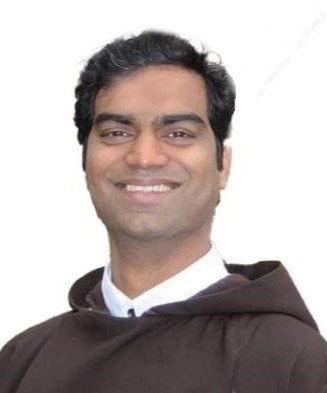The Eucharist “The source and summit of the Christian Life”.
Fr Nelson Lobo OFM Cap
(Deut 8: 2-3, 14b-16a; Psalm 147; 1Cor 10:16-17; John 6:51-58)

Eucharistic History: The Feast of Corpus Christi originated in 1246 with Fr. Robert a Belgium bishop. He was persuaded to initiate the feast by St. Juliana of Belgium (1222–58). It seems she had a vision. In that vision she saw the church under the full moon but with one dark spot on the moon. For her the dark spot meant in the liturgical calendar the absence of the feast of Corpus Christi. For a long time, she kept on pushing the church authorities to establish this feast. Pope Urban IV instituted the feast in 1264. By the mid-14th century, the festival was generally accepted, and in the 15th century it became, in effect, one of the principal feasts of the Catholic Church. The Eucharistic procession became the feast’s most prominent feature. During the Reformation, the festival was suppressed in Protestant churches.
Eucharistic Miracles: Meanwhile in 1263 a German priest Peter of Prague was celebrating mass above the tomb of St. Christina in the town of Bolsena in Italy. When he raised the host, blood started to trickle over his hands and onto the altar. A year later after investigation and authentication the miracle was confirmed, and it moved Pope Urban IV to institute the feast of Corpus Cristi. The white, blood-stained linen corporal cloth can still be seen in the Basilica of Orvieto north of Rome. 500 years earlier there was another great Eucharistic miracle in Lanciano, Italy.
Scientific Eucharistic Evidence: For those who still doubt the Eucharistic miracles I want you to know that scientific studies have been done on such miracles. The medical authorities found that the flesh consists of muscular tissue from a human heart, and the blood has the same type-AB-as the blood on the shroud of Turin. The blood also contains proteins in the same normal proportions that are found in human blood.
Eucharistic Conversions: In recent times some protestant pastors have left their protestant churches and joined the Catholic Church because they realized the authenticity of the sacrament of the Eucharist. I remember reading the powerful testimony of Anglican Church pastor Henry Newman of England. He was a highly paid pastor in the Anglican Church. He left the Anglican church and joined the Catholic Church. He later got ordained as a catholic priest. He was made a cardinal for his great services in the church. He is now a saint (2019) in the Catholic Church. Scott Hann (he is still living) at one time a highly acclaimed protestant theologian and pastor later became catholic and now his son is ordained a priest in the catholic church. You might have also heard the conversion story of baptist pastor Steve (Stephen) Ray. Some other protestant pastors such as Benny Hinn though they don’t believe in the Catholic mass they do believe and acknowledge the Eucharistic miracles.
St. Anthony Preaches: My dear sisters and brothers as we are participating in the novenas of St. Anthony, I want you to know that St. Anthony preached on the feast of corpus Cristi. St. Anthony compares the act of Abraham serving his guest the three angels and the act of Jesus washing his disciples’ feet [Jn 13.4-5] Abraham said: I will fetch a little water and wash your feet, and rest yourselves under the tree. 5 And I will bring a morsel of bread, that you may refresh your hearts. [Gen 18.4-5] St. Anthony comments “What Abraham did for the three angels, Christ did for his holy Apostles. He knelt like a servant at their feet, and, kneeling, washed their feet. He who is worshipped by the angels on heaven knelt at the feet of fishermen. That head, before which, the angels tremble bowed to the feet of poor men. Peter, therefore, cried in fear: Thou shalt never wash my feet [Jn 13.8]. He could not bear that God should humble himself at his feet, and was overcome with fear.
Dear brothers and sisters the feast of the body and blood of Christ tells us three important things for our daily worship to become worthy during mass.
- FIRST OUR PREPARATION. Jesus sent some of His disciples into Jerusalem to make preparations for the Passover. How do you prepare yourself for mass? Do you long to participate in the Holy Mass? Do you read the readings of the day before you come to the church? Do you realize that Jesus humbles himself during mass to meet you? Do you reach the church on time? Do you wear descent clothes to meet the Lord of Heaven and earth? Do you maintain church discipline during mass? Even while watching online mass, do you remain respectful and focused?
- SECOND OUR SELF-EXAMINATION. The statement of Jesus “one of you who eats with me shall betray me” calls for self-examination. Do you really feel sorry for your sins before you take communion? Do you participate in the sacrament of confession regularly?
- THIRD JOYFUL ANTICIPATION. Jesus said, “I will drink no more of the fruit of the vine, until that day when I drink it new in the kingdom of God.” Do you believe that after your death you will join the communion of saints in the heavenly banquet?
Let’s understand the significance of the Holy Eucharist in the life of the church and in the life of Catholics. Let’s love our Holy mass and let’s give it the top most respect it deserves.


